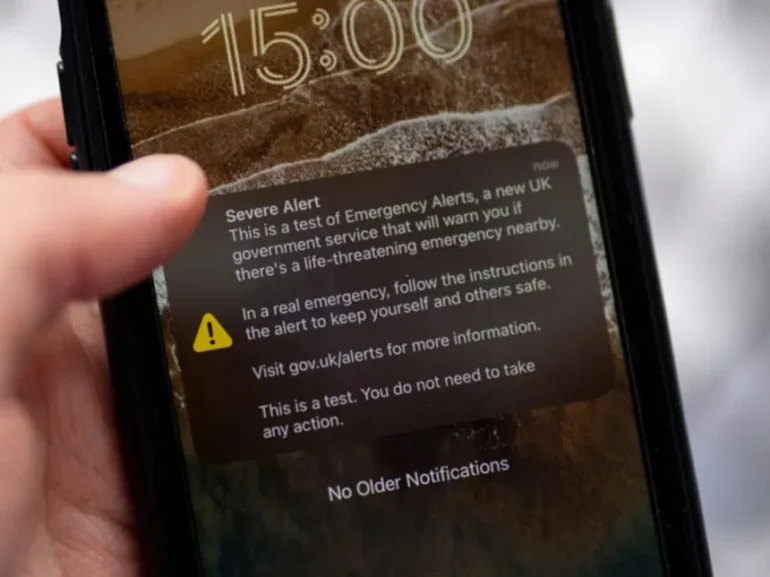This coming Saturday, September 7, 2025, millions of mobile phones across the UK will suddenly blare a loud siren and vibrate for 10 seconds, but don’t panic, it’s just a test.
At 3 PM sharp, the UK government will conduct a nationwide emergency alert drill, sending a text message to every 4G and 5G-connected device in England, Scotland, Wales, and Northern Ireland. The message, delivered in both English and Welsh, will reassure recipients that no action is needed this time.
Why Is This Happening?
The test is part of the UK’s Emergency Alerts system, designed to warn the public about life-threatening dangers like terrorist attacks, extreme weather, or public safety threats in real time.
Pat McFadden, Chancellor of the Duchy of Lancaster, compared it to a “fire alarm for the nation.”
“Testing this system is crucial,” he said. “We need to know it works when lives are at stake. In a real emergency, these alerts could be the difference between safety and danger.”
Since its first nationwide test in April 2023, the system has been activated five times, including during:
- Storm Eowyn (January 2024)
- Flash floods in Cumbria and Leicestershire
- The discovery of an unexploded WWII bomb in Plymouth
What Will the Alert Say?
The message will read:
“This is a test of Emergency Alerts, a UK government service that will warn you if there’s a life-threatening emergency nearby.
You do not need to take any action. In a real emergency, follow the instructions in the alert to keep yourself and others safe.
Find simple and effective advice on how to prepare for emergencies at gov.uk/prepare.
Visit gov.uk/alerts for more information or to view this message in Welsh.”
Concerns Over Hidden Phones & Accessibility
While the system is designed for public safety, domestic abuse charities have raised concerns about hidden phone devices kept secret by victims in dangerous situations. A sudden loud alarm could reveal their location to abusers.
The government has assured that phones switched off or in airplane mode won’t receive the alert, and there’s guidance on how to opt out by disabling emergency alerts in phone settings.
Sarah Olney, a Liberal Democrat MP, has also urged the government to adopt Scandinavian-style emergency preparedness methods, such as printed pamphlets, to reach those without smartphones.
“Not everyone has a mobile, especially older or vulnerable people,” she said. “We need multiple ways to communicate in a crisis.”
How Other Countries Handle Emergency Alerts
The UK isn’t alone in using mass alerts. Other countries have similar systems:
- USA: The Wireless Emergency Alerts (WEA) system sends warnings about hurricanes, AMBER alerts, and national threats.
- Japan: The J-Alert system broadcasts earthquake and tsunami warnings instantly.
- Netherlands: Tested its system in 2022, causing some panic due to a lack of public awareness.
The UK hopes to avoid confusion by clearly labelling the September 7 alert as a test.
Will It Disrupt Your Day?
The alert will override silent modes, so even if your phone is muted, you’ll hear the siren. However:
- Driving? Don’t check your phone, wait until it’s safe.
- Watching TV or streaming? Some broadcasters may briefly interrupt programming.
- At work or in a meeting? Expect a sudden chorus of beeps.
What’s Next?
If successful, the system could become a key tool in future crises, from terror threats to natural disasters. The government may also explore expanding alerts to landlines and radio broadcasts to ensure no one is left uninformed.
So when your phone screams this Saturday, remember, it’s just a drill. But one day, it might just save your life.
What do you think of the UK’s emergency alert system? Should there be more ways to reach people in an emergency? Let us know in the comments and read more stories here.








